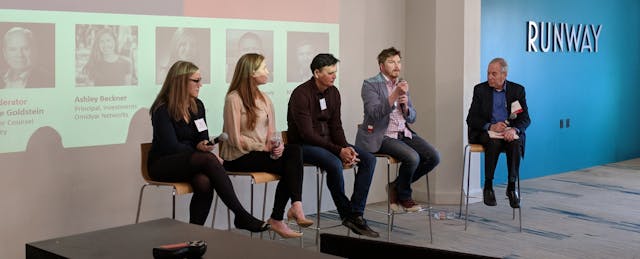From comments about a hurricane wiping out an education system, to loud chatters drowning out a presentation on federal policies and regulations, the brashness of Silicon Valley was on display. At an industry-focused education technology event hosted by Cooley, a law firm, in San Francisco this past Wednesday, several dozen entrepreneurs and investors gathered to network, scout for new business opportunities and share a mix of practical and questionable wisdom.
Opening Salvo
“If there was one good thing that came out of Katrina, [it’s that] it wiped out the K-12 education system in New Orleans,” said Mike Goldstein, a senior counsel at Cooley. And in its place, he added, “you spread this wonderful fertilizer on the ground...and all these flowers grew,” in reference to charter schools.
That was just the first of many questionable comments throughout the evening, as Goldstein introduced Ashley Beckner, a principal at Omidyar Network who has worked with Bricolage Academy in New Orleans (which Goldstein described as a “happy hunting ground for charters”).
Speaking in broad strokes, Goldstein proclaimed that the education industry has transformed from a system where a student comes in, goes through the process and “pops out the other end clutching a degree” to one that has a “whole lot of different elements that feed into the process of education, the process of learning.”
The panelists were a bit more specific. Michael Staton, a partner at Learn Capital, said that over the past six to seven years, he’s seen a large opportunity in the market for direct-to-consumer learning tools, specifically around reskilling and knowledge-building for working professionals. These career-accelerating services, he added, are converging with many high-growth professions that require skills and knowledge that he claims traditional education institutions have largely ignored.
However, he noted that these tools and services have yet to reach a broad base of learners. Rather, they target professionals who have already successfully navigated the education system, and know how to take advantage of online learning opportunities to advance their careers.
Kelly Fuller, a director at BMO Capital Markets, shared similar thoughts. Ten years ago, she claimed, the predominant mindset in higher education was that the higher the tuition, the better the program. That “blew up,” she said, and now the focus is on short-form certification programs. Companies are focusing on how to assess the skills of their existing workforce, and what they can do to reskill their employees.
Another focus for her firm, she added, are backend tools that help teachers and administrators do their jobs more efficiently. It’s “shocking how much is still done on Excel spreadsheets and pieces of paper,” she said.
George Straschnov, the managing director of Bisk Ventures, said his firm is interested in data, assessment and improving the student experience.
Always Be Raising
Despite very mixed messages about the fundraising process, the entrepreneurs on the second panel appeared unified on the notion that a CEO’s job is to always be raising capital.
Max Ventilla, CEO of AltSchool, described his fundraising experience as being “absolutely awful and almost impossible at every stage.” That latter part of his statement is not the case, as he also boasted that AltSchool has raised about $200 million so far. Still, he added that although the “always be raising” mentality is “a natural trend, it comes at a huge cost to you and the company over the long term.” (Last year, AltSchool pivoted from operating schools to selling software.)
By contrast, Ben Nelson, CEO of The Minerva Project, seemed very casual—even flippant—about the process. Anyone with a good elevator pitch will eventually get funded, he claimed, since the amount of time investors spend digging into a company is “shockingly low.” His pitch was a mix of plans to “build the world’s greatest university from scratch” and bashing Ivy League schools like Harvard as “abominations” that “shouldn’t really be attracting talent at all.”
That, apparently, helped him land a $25 million seed round from Benchmark Capital in 2012. Minerva has since raised another $70 million.
But Degreed CEO David Blake described his fundraising experience as a “harrowing journey” that nearly cost him his marriage and family. “I maxed out every credit card application that came in the mail.” He’s raised more than $34 million across three funding rounds.
Referring to a quote from Jeff Bezos that “innovation requires the willingness to be misunderstood for long periods of time,” Blake said: “Well, the unfortunate thing about being a startup with no money is you don’t have a lot of time to be misunderstood.”


